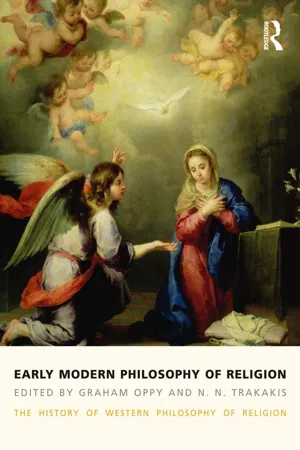Physics
Blaise Pascal
Blaise Pascal was a French mathematician, physicist, and philosopher known for his contributions to the fields of fluid mechanics and pressure. He formulated Pascal's law, which states that a change in pressure applied to an enclosed fluid is transmitted undiminished to all portions of the fluid. His work laid the foundation for the study of hydrodynamics and hydraulic engineering.
Written by Perlego with AI-assistance
Related key terms
2 Key excerpts on "Blaise Pascal"
- eBook - ePub
Early Modern Philosophy of Religion
The History of Western Philosophy of Religion, volume 3
- Graham Oppy, N. N. Trakakis(Authors)
- 2014(Publication Date)
- Routledge(Publisher)
10 Blaise Pascal William David WetselBlaise Pascal (1623–62) was a towering intellectual figure in seventeenth-century France, the last of the universal geniuses in European history. His discoveries and ideas still have great influence in modern intellectual and scientific life. A true polymath, he made contributions in physics, mathematics, philosophy and theology. Students of physics have heard of Pascal’s vases; students of mathematics know of his triangle. It was he who established experimentally that the weight of the earth’s atmosphere varies according to altitude and first gave theoretical embodiment to the idea of the vacuum. His ideas also gave rise variously to the concept of the calculator or computer and to inexpensive public transportation.In 1646, at the age of 23, Pascal had a profound religious experience when he became associated with a group of disciples of Jean du Vergier, the Abbé de Saint-Cyran, who lived in the vicinity of Rouen. He accepted their doctrine of ‘conversion’ or abandonment of the world and submission to God, and even converted his family to Jansenism. This conversion, however, did not have an immediate effect on his work. One reason was that he became seriously ill in 1647 and returned to Paris, where his physicians advised him to find diversions from his work. That advice led him to relax the religious discipline.Another profound mystical experience occurred in 1654 when Pascal became intimately associated with the Convent of Port-Royal, where his sister Jacqueline had become a religious initiate and where Saint-Cyran was spiritual director. He recorded this second, intense religious experience in his Mémorial (1654). This experience marked Pascal indelibly for the rest of his life, as is evidenced by the fact that the Mémorial , a document of simple physical appearance dominated by lines, dashes and exclamations, was sewn into the lining of his coat. In the following year, 1655, one of the many retreats that Pascal undertook at Port-Royal led to his Conversation with M. de Sacy on Epictetus and Montaigne - eBook - ePub
- E.T. Bell(Author)
- 2014(Publication Date)
- Touchstone(Publisher)
CHAPTER FIVE“Greatness and Misery of Man”
PASCALWe see . . . that the theory of probabilities is at bottom only common sense reduced to calculation; it makes us appreciate with exactitude what reasonable minds feel by a sort of instinct, often without being able to account for it. . . . It is remarkable that [this] science, which originated in the consideration of games of chance, should have become the most important object of human knowledge.—P. S. LAPLACEYOUNGER BY TWENTY SEVEN YEARS than his great contemporary Descartes, Blaise Pascal was born at Clermont, Auvergne, France, on June 19, 1623, and outlived Descartes by twelve years. His father Êtienne Pascal, president of the court of aids at Clermont, was a man of culture and had some claim to intellectual distinction in his own times; his mother, Antoinette Bégone, died when her son was four. Pascal had two beautiful and talented sisters, Gilberte, who became Madame Périer, and Jacqueline, both of whom, the latter especially, played important parts in his life.Blaise Pascal is best known to the general reader for his two literary classics, the Pensées and the Lettres écrites par Louis de Montalte à un provincial de ses amis commonly referred to as the “Provincial Letters,” and it is customary to condense his mathematical career to a few paragraphs in the display of his religious prodigies. Here our point of view must necessarily be somewhat oblique, and we shall consider Pascal primarily as a highly gifted mathematician who let his masochistic proclivities for self-torturing and profitless speculations on the sectarian controversies of his day degrade him to what would now be called a religious neurotic.On the mathematical side Pascal is perhaps the greatest might-have-been in history. He had the misfortune to precede Newton by only a few years and to be a contemporary of Descartes and Fermat, both more stable men than himself. His most novel work, the creation of the mathematical theory of probability, was shared with Fermat, who could easily have done it alone. In geometry, for which he is famous as a sort of infant prodigy, the creative idea was supplied by a man—Desargues—of much lesser celebrity.
Learn about this page
Index pages curate the most relevant extracts from our library of academic textbooks. They’ve been created using an in-house natural language model (NLM), each adding context and meaning to key research topics.

